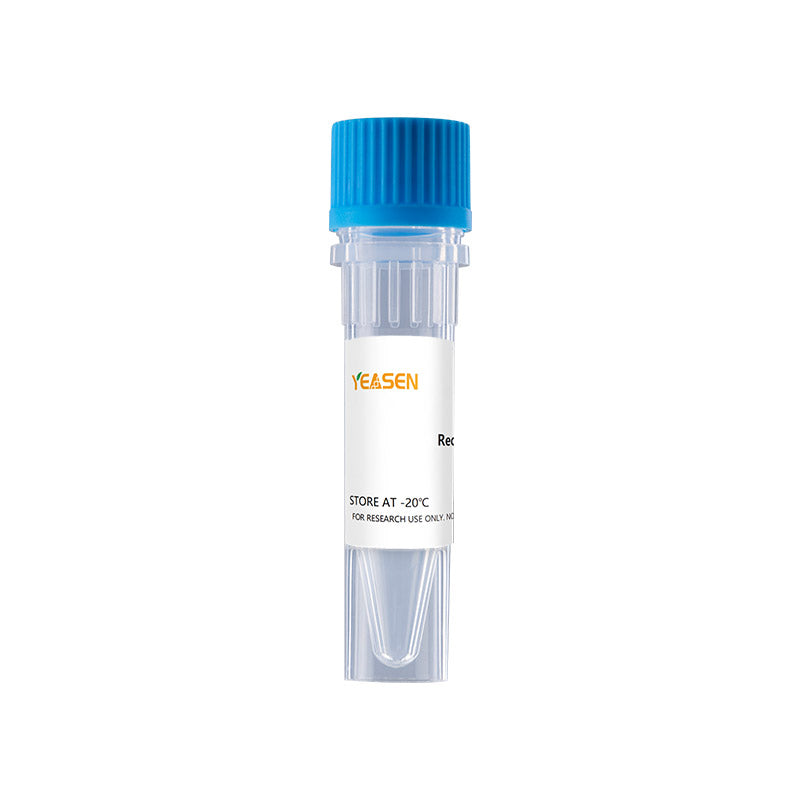Description
Human KGF-1 also known as Fibroblast growth factor 7 (FGF-7), is encoded by the FGF7 gene. Mature human KGF, which is active across species, shares 98% aa sequence identity with bovine, equine, ovine and canine, 96% with mouse and porcine, and 92% with rat KGF, respectively. KGF-1 is a member of the fibroblast growth factor family(FGFs), which binds to specific receptors in epithelial cells. It can promote the proliferation, migration and differentiation of epithelial cells, embryo development, immune reconstitution and repair of wounds, thus is widely used in clinical practice.
Product Properties
|
Synonyms |
FGF7, FGF-7, HBGF7, HBGF-7, Heparin-binding growth factor 7, keratinocyte growth factor, KGF |
|
Accession |
|
|
GeneID |
|
|
Source |
E.coli-derived Human KGF-1/FGF-7, Cys32-Thr194. |
|
Molecular Weight |
Approximately 18.9 kDa. |
|
AA Sequence |
CNDMTPEQMA TNVNCSSPER HTRSYDYMEG GDIRVRRLFC RTQWYLRIDK RGKVKGTQEM KNNYNIMEIR TVAVGIVAIK GVESEFYLAM NKEGKLYAKK ECNEDCNFKE LILENHYNTY ASAKWTHNGG EMFVALNQKG IPVRGKKTKK EQKTAHFLPM AIT |
|
Tag |
None |
|
Physical Appearance |
Sterile Filtered White lyophilized (freeze-dried) powder. |
|
Purity |
> 96% by SDS-PAGE and HPLC analyses. |
|
Biological Activity |
The ED50 as determined by thymidine uptake assay using FGF-receptors transfected BaF3 cells is less than 10 ng/mL, corresponding to a specific activity of > 1.0 × 105 IU/mg. Fully biologically active when compared to standard. |
|
Endotoxin |
< 1.0 EU per 1μg of the protein by the LAL method. |
|
Formulation |
Lyophilized from a 0.2 μm filtered concentrated solution in 20 mM PB, 0.5 M NaCl, pH 8.0. |
|
Reconstitution |
We recommend that this vial be briefly centrifuged prior to opening to bring the contents to the bottom. Reconstitute in sterile distilled water or aqueous buffer containing 0.1% BSA to a concentration of 0.1-1.0 mg/mL. Stock solutions should be apportioned into working aliquots and stored at ≤ -20℃. Further dilutions should be made in appropriate buffered solutions. |
Shipping and Storage
The products are shipped with ice pack and can be stored at -20 ℃ for 1 year.
1 month, 2 to 8 °C under sterile conditions after reconstitution.
3 months, -20 °C under sterile conditions after reconstitution.
Recommend to aliquot the protein into smaller quantities when first used and avoid repeated freeze-thaw cycles.
Cautions
1.Avoid repeated freeze-thaw cycles.
2.For your safety and health, please wear lab coats and disposable gloves for operation.
3.For research use only!
Payment & Security
Your payment information is processed securely. We do not store credit card details nor have access to your credit card information.
Inquiry
You may also like
FAQ
The product is for research purposes only and is not intended for therapeutic or diagnostic use in humans or animals. Products and content are protected by patents, trademarks, and copyrights owned by Yeasen Biotechnology. Trademark symbols indicate the country of origin, not necessarily registration in all regions.
Certain applications may require additional third-party intellectual property rights.
Yeasen is dedicated to ethical science, believing our research should address critical questions while ensuring safety and ethical standards.

